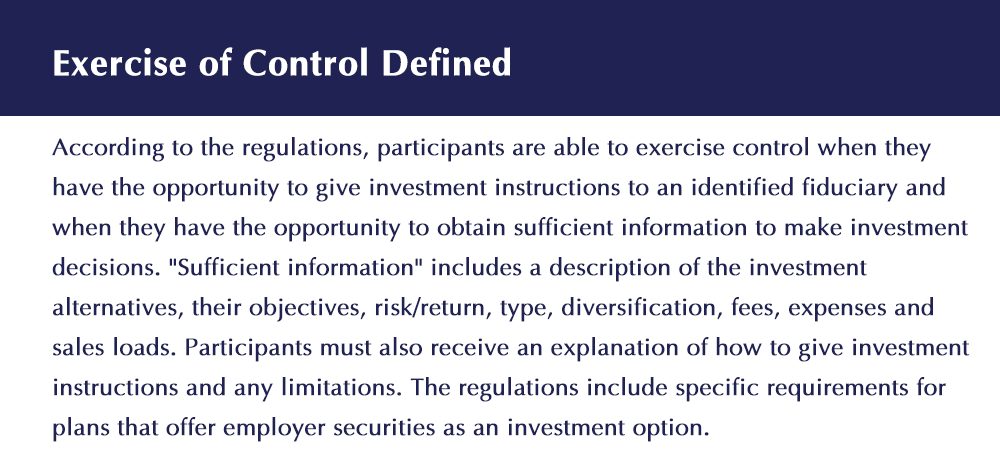For several years now, the responsibility for financing one’s retirement has increasingly shifted from the employer to the employee. According to the Bureau of Labor Statistics, over the 15-year period from 1985 to 2000, the primary retirement plan participation of employees moved from defined benefit plans to defined contribution plans, such as 401(k) plans. And that trend has certainly continued.
Plan Features
A key feature in most 401(k) plans is that participants make their own investment choices from a set of options offered by the plan. The fact that participants make their own investment choices might lead business owners to conclude that participants — and participants alone — are responsible for the consequences of these decisions. However, plan fiduciaries, such as the employer plan sponsor, are not automatically absolved of responsibility for a participant’s investment decisions merely because the plan offered choices and participants made them. In order for a plan fiduciary to escape liability for losses resulting from a participant’s investment decisions, the 401(k) plan must comply with the Employee Retirement Income Security Act (ERISA) Section 404(c).
Compliance With Section 404
The “broad range of investment alternatives” must include at least three diversified investment options that enable a participant to materially affect the potential return and minimize the risk of large losses. While most 401(k) products today include more than this minimum number of investment options, the plan sponsor (perhaps with the assistance of an investment professional) still needs to determine whether the asset classes and style of the funds offered satisfy the diversification, potential return and risk minimization requirements.
It is important to note that ERISA Section 404(c) imposes no obligation on plan sponsors to offer investment advice to participants. Also, 404(c) protection is only available to the extent that a participant directs the investments of his or her individual account. It also requires several communications to be made to participants, including notice that the plan intends to comply with 404(c) and that participants are responsible for the results of their investment decisions.
Market Factors
Events from several years ago make a strong case for seeking 404(c) protection. Two bear markets in the 2000s hit investors hard, including many 401(k) participants. Market gains that came easy faded quickly and 401(k) balances plummeted. Corporate scandals have led to collapsing retirement plans at affected firms. Questionable trading activity within mutual funds was reported in the news. All these events have focused attention on 401(k) investment performance and the potential liability of plan fiduciaries for investment losses.
Caution: The relief that ERISA Section 404(c) provides plan fiduciaries is not absolute. Regardless of 404(c) compliance, plan sponsors continue to have the duty to act prudently and solely in the interest of plan participants when selecting the investment options offered by the plan. Furthermore, both investment managers and their offerings must be monitored to ensure that there continue to be prudent choices.
Note: Under the Pension Protection Act, signed into law in 2006, retirement plan sponsors and fiduciaries are allowed to hire and compensate “fiduciary advisors” to supply investment advice and make investment transactions for participants and beneficiaries of defined contribution plans and beneficiaries of IRAs. A fiduciary advisor can be a registered broker or dealer, a registered investment advisor, a bank or similar financial institution, an insurance company or an affiliate, employee, agent or representative of one of the above.

© Copyright 2019 Thomson Reuters. All rights reserved. Republication or redistribution of Thomson Reuters content, including by framing or similar means, is prohibited without the prior written consent of Thomson Reuters. Thomson Reuters and the Kinesis logo are trademarks of Thomson Reuters and its affiliated companies.
Disclaimer of Liability
Our firm provides the information in this e-newsletter for general guidance only, and does not constitute the provision of legal advice, tax advice, accounting services, investment advice or professional consulting of any kind. The information provided herein should not be used as a substitute for consultation with professional tax, accounting, legal or other competent advisers. Before making any decision or taking any action, you should consult a professional adviser who has been provided with all pertinent facts relevant to your particular situation. Tax articles in this e-newsletter are not intended to be used, and cannot be used by any taxpayer, for the purpose of avoiding accuracy-related penalties that may be imposed on the taxpayer. The information is provided “as is,” with no assurance or guarantee of completeness, accuracy or timeliness of the information, and without warranty of any kind, express or implied, including but not limited to warranties of performance, merchantability and fitness for a particular purpose.
Blog
Nonprofit Insights

